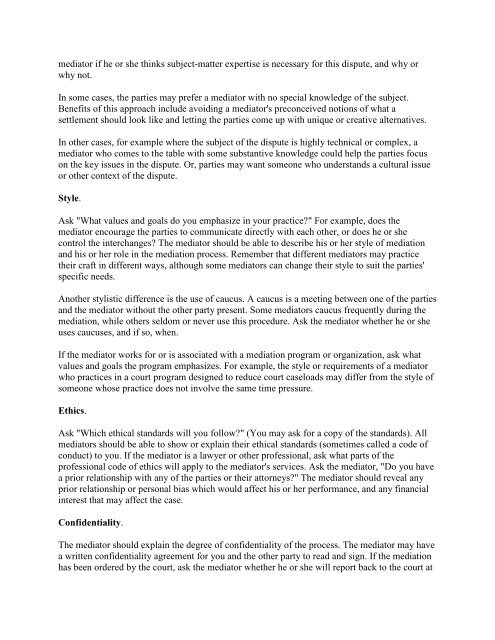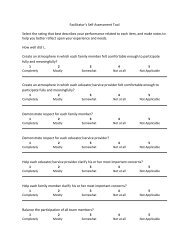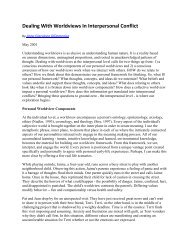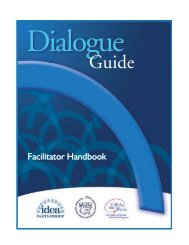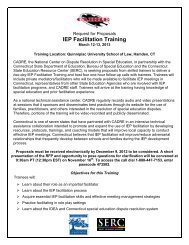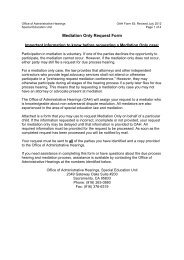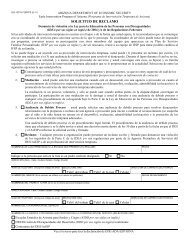Five Steps to Choosing a Qualified Mediator.pdf - Direction Service
Five Steps to Choosing a Qualified Mediator.pdf - Direction Service
Five Steps to Choosing a Qualified Mediator.pdf - Direction Service
You also want an ePaper? Increase the reach of your titles
YUMPU automatically turns print PDFs into web optimized ePapers that Google loves.
media<strong>to</strong>r if he or she thinks subject-matter expertise is necessary for this dispute, and why or<br />
why not.<br />
In some cases, the parties may prefer a media<strong>to</strong>r with no special knowledge of the subject.<br />
Benefits of this approach include avoiding a media<strong>to</strong>r's preconceived notions of what a<br />
settlement should look like and letting the parties come up with unique or creative alternatives.<br />
In other cases, for example where the subject of the dispute is highly technical or complex, a<br />
media<strong>to</strong>r who comes <strong>to</strong> the table with some substantive knowledge could help the parties focus<br />
on the key issues in the dispute. Or, parties may want someone who understands a cultural issue<br />
or other context of the dispute.<br />
Style.<br />
Ask "What values and goals do you emphasize in your practice?" For example, does the<br />
media<strong>to</strong>r encourage the parties <strong>to</strong> communicate directly with each other, or does he or she<br />
control the interchanges? The media<strong>to</strong>r should be able <strong>to</strong> describe his or her style of mediation<br />
and his or her role in the mediation process. Remember that different media<strong>to</strong>rs may practice<br />
their craft in different ways, although some media<strong>to</strong>rs can change their style <strong>to</strong> suit the parties'<br />
specific needs.<br />
Another stylistic difference is the use of caucus. A caucus is a meeting between one of the parties<br />
and the media<strong>to</strong>r without the other party present. Some media<strong>to</strong>rs caucus frequently during the<br />
mediation, while others seldom or never use this procedure. Ask the media<strong>to</strong>r whether he or she<br />
uses caucuses, and if so, when.<br />
If the media<strong>to</strong>r works for or is associated with a mediation program or organization, ask what<br />
values and goals the program emphasizes. For example, the style or requirements of a media<strong>to</strong>r<br />
who practices in a court program designed <strong>to</strong> reduce court caseloads may differ from the style of<br />
someone whose practice does not involve the same time pressure.<br />
Ethics.<br />
Ask "Which ethical standards will you follow?" (You may ask for a copy of the standards). All<br />
media<strong>to</strong>rs should be able <strong>to</strong> show or explain their ethical standards (sometimes called a code of<br />
conduct) <strong>to</strong> you. If the media<strong>to</strong>r is a lawyer or other professional, ask what parts of the<br />
professional code of ethics will apply <strong>to</strong> the media<strong>to</strong>r's services. Ask the media<strong>to</strong>r, "Do you have<br />
a prior relationship with any of the parties or their at<strong>to</strong>rneys?" The media<strong>to</strong>r should reveal any<br />
prior relationship or personal bias which would affect his or her performance, and any financial<br />
interest that may affect the case.<br />
Confidentiality.<br />
The media<strong>to</strong>r should explain the degree of confidentiality of the process. The media<strong>to</strong>r may have<br />
a written confidentiality agreement for you and the other party <strong>to</strong> read and sign. If the mediation<br />
has been ordered by the court, ask the media<strong>to</strong>r whether he or she will report back <strong>to</strong> the court at


